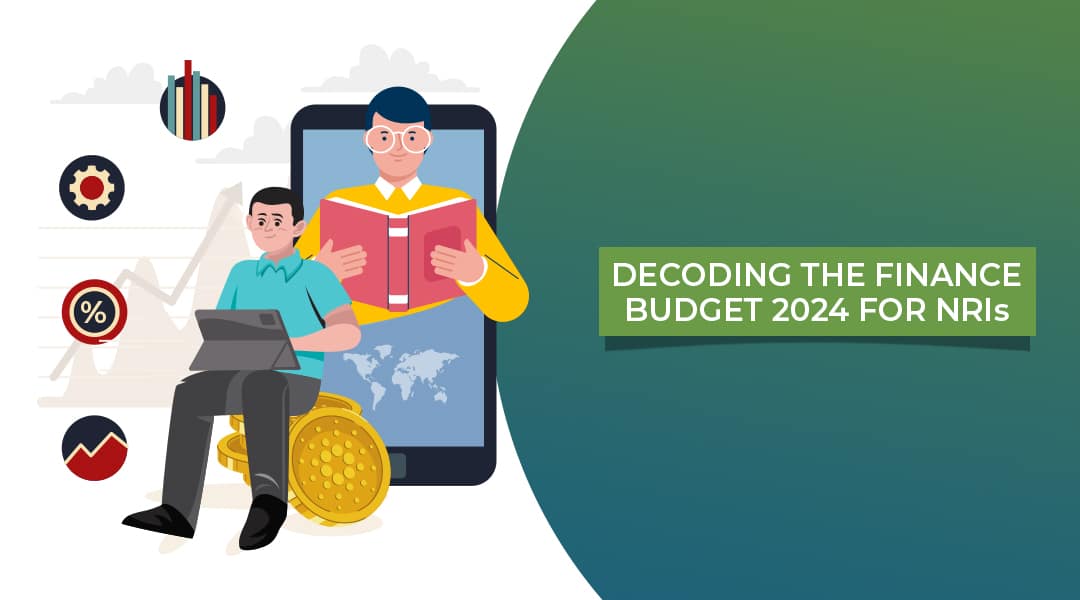Finance Minister Nirmala Sitharaman introduced broad reforms in the Finance Budget 2024, which have impacted the NRI community as well. For the NRIs, changes are nearly a crunch that needs to be interpreted and implemented correctly in terms of financial planning, tax liabilities, and investing strategies. The current blog deciphers some significant features of the Finance Budget 2024 for NRIs, wherein details about capital gains tax, real estate opportunities, and new provisions of income-tax exemptions have been discussed.
Key Highlights of Budget 2024 for NRIs
In attracting a special focus on NRIs, Finance Budget 2024 has realized its ever-growing role within the Indian economy and recognized the complexities they face with regard to NRI taxation 2024. The most significant changes in this budget are those regarding capital gains taxes with revisions, adjustments relating to NRI residential status for taxation purposes, and new provisions relating to DTAA. Such reforms will simplify the process of taxation, thereby enhancing investment opportunities within the Indian economy.
Some of the key changes are as follows:
- Simplified framework for NRI capital gains tax
- Changes in the NRI residential status for tax purposes
- Increased TDS on some capital gains
- Increased investment opportunities in real estate with respect to low stamp duty charges
- New Double Tax Avoidance Agreement (DTAA) for NRIs provisions to ease the burden of paying taxes in two countries
Revised Capital Gains Tax for NRIs
One big change in the Finance Budget 2024 is the revision of tax rates on capital gains in the case of NRIs pertaining to equities, mutual funds, and NRI property investment.
- Short-term capital gains: With the tax rate on short-term capital gains from transactions in listed equities now standing at 20%, it is exactly the same as for the resident class. This would have a serious impact on NRIs, who are huge investors in the stock market, and put more burden on their current tax liability.
- Long-term Capital Gains: Here again, the tax rate on long-term capital gains from listed equities and mutual funds has increased by 25%. It’s not particularly a landmark move, though the exclusion limit has been hiked to ₹1.25 million. The relief in terms of increased limits seems to have partly alleviated the impact.
- Other Source of Wealth: Capital Gains of other properties owned, such as immovable properties, will be taxed at the rate of 12.5%. Indexation benefits are stripped off. Therefore sales proceeds will have to be tax-deducted fully, no inflationary factor deducted.
These reforms bring parity between NRIs and other residents who enjoy the status of residence. Both will face the same tax brackets.
Impact on NRI Residential Status for Tax Purposes
A significant amendment introduced through the Finance Budget 2024 is the simplification of the test to define a Non-Resident Indian for tax purposes. As already updated in one of the tests that determine NRI residential status, NRIs who stay more than 120 days in India within the period of a financial year can now be called residents for tax purposes and consequently increase their tax burden in India.
This will be a huge shock to NRIs who have significant ties with India, especially those with split lives across various countries. NRIs should plan their visits to India well in advance so that they do not inadvertently fall into a higher tax bracket.
New Double Taxation Avoidance Agreement (DTAA) Provisions
The DTAA is an important gateway that prevents non-resident Indians from paying taxes twice, once in their country of residence and secondly in India. Following this trend, the Finance Budget 2024 has brought newer provisions for the DTAA, which makes its process simpler.
India has signed more agreements on DTAA with other countries, thereby increasing the scope of countries where NRIs can avail tax sops. The provisions have also been amended so as to reduce the complexity of tax filing under the DTAA arrangements. For an NRI, this is good news since it would bring down administrative hassles in filing taxes in two countries and ensure a streamlined procedure to claim tax benefits.
TDS Changes and their Implications for NRIs
Among the wide changes in Tax Deducted at Source for NRIs, Budget 2024 has brought one that should be very far-reaching. That is, in the enhancement of the TDS rates on the capital gains derived from the sale of equities and real estate:
- Long-term Capital Gains: TDS on long-term capital gains increased by 10 percent to 12.5 percent.
- Short-term Capital Gains: TDS on short-term capital gains from listed equities is strengthened at 20%.
Also, a sales value for property sold above ₹50 lakh would attract TDS as it does not matter how a sale amount would be categorized. It thus makes the process of tax lighter but instead costs the money of the NRI much more because of property sales made in India. NRIs must have their transaction planned well and also need to consult a trusted NRI tax consultant so that the taxing amount is not expected at all times.
Real Estate Investment Opportunities for NRIs
In spite of TDS escalating with regard to property transactions, the Budget 2024 has opened attractive opportunities in real estate for investment in India for NRIs. In their effort to make stamp duty charges lesser, the state authorities are being cautioned by the government and for the properties owned by women, which may attract more NRIs in the booming property market of India.
In the past few years, India has further invested in infrastructure and projects of smart cities. Due to this factor, the Indian real estate market becomes even more attractive for NRIs in terms of long-term investment opportunities. So, reforms related to this sector along with the sound economic growth of India make real estate a good choice for NRIs in 2024.
NRI Income Tax Exemptions and Benefits
Finance Budget 2024 introduces new exemptions from the income tax of NRIs, making tax planning more effective and easier to carry out. The exemption limit on long-term capital gains has now been increased to ₹1.25 million, hence providing some relief in the face of enhanced tax rates.
In income tax return filing for NRIs, the standard deduction under the new tax regime has been increased from INR 50,000 to INR 75,000. These changes present both challenges and opportunities for NRIs.
Another good reason for the new pension regime is the equivalent of a 14% employer contribution limit by Section 80CCD(2), which has potentially opened up the National Pension System to NRIs as an excellent means of building a robust retirement fund.
These tax benefits for NRIs facilitate planning as they create better options to save and keep track of India’s shifting tax terrain.
Planning for the Future: Financial Strategies for NRIs
Overall, there is an opportunity and challenge for NRIs with reforms in the Finance Budget 2024. To effectively negotiate such reforms, NRIs need a holistic financial plan that includes the following:
- Investment Diversification: Higher TDS and capital gains tax rates require greater diversification of portfolios so as to offset the tax burden arising from the imposition.
- Tax-efficient real estate investment: Stamp duty fees are much less here, and investing in smart cities can provide tax-efficient wealth-building options for NRIs.
- Tax advisors: Meeting an NRI tax advisor or an NRI tax consultant will ensure that you opt for the best tax planning available and are compliant with the new DTAA and TDS rules.
GGC: NRI Tax Consultants
Here at GGC, we provide quality NRI taxation services. Our expert NRI tax advisors ensure the client is taken through the intricate details of NRI tax return filing, capital gains taxes, and planning for investments. The DTAA for NRIs could be that piece of help you require, or you perhaps need some clarity on the latest NRI Income Tax Rules 2024. GGC’s tax professionals will help ensure compliance and give strategic financial solutions. Let us help you plan your financial future in India.
Conclusion
Changes under the Finance Budget 2024 for NRIs would involve new capital gains taxes and rises in TDS, but real estate opportunities, along with extended tax exemptions, are also expected. Consequently, this is an important event to keep track of to boost financial strategies and comply with all current and future tax laws of India.
For the best professional advice on navigating NRI taxation services and NRI investment opportunities 2024, seek professional NRI tax consultants of GGC to secure your financial future.
FAQs
What’s the new capital gains tax rate for NRIs?
Capital gain computed from securities listed equities is charged to tax at 20% whereas the long-term gains are charged to tax at 12.5%.
How does the new TDS rule affect NRIs?
TDS on capital gains from property and listed equities has increased, thereby affecting the immediate tax liabilities for NRIs.
New DTAA provisions. The new DTAA provisions facilitate easy tax filing for NRIs, reducing double taxation.
Can NRIs be availed of tax exemptions in India?
Yes, Finance Budget 2024 increases exemption limits for long-term capital gains besides introducing pension savings benefits.
Is real estate still an attractive investment opportunity for NRIs in 2024?
Real estate, though costly, remains a promising investment opportunity for NRIs since most of the stamp duty charges have dwindled and other forms of infrastructure investments are relatively less expensive.



